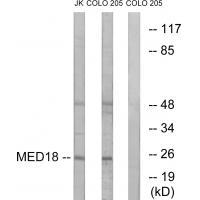
| WB | 咨询技术 | Human,Mouse,Rat |
| IF | 咨询技术 | Human,Mouse,Rat |
| IHC | 1/200 - 1/1000 | Human,Mouse,Rat |
| ICC | 1/200 - 1/1000 | Human,Mouse,Rat |
| FCM | 咨询技术 | Human,Mouse,Rat |
| Elisa | 1/10000 | Human,Mouse,Rat |
| Aliases | FLJ20045; mediator 18; mediator of RNA polymerase II transcription 18; p28b; |
| Entrez GeneID | 54797; |
| WB Predicted band size | 24kDa |
| Host/Isotype | Rabbit IgG |
| Antibody Type | Primary antibody |
| Storage | Store at 4°C short term. Aliquot and store at -20°C long term. Avoid freeze/thaw cycles. |
| Species Reactivity | Human,Mouse |
| Immunogen | Synthesized peptide derived from internal of human MED18. |
| Formulation | Purified antibody in PBS with 0.05% sodium azide. |
+ +
以下是关于Foxp3抗体的3篇代表性文献的简要信息:
1. **文献名称**:Control of regulatory T cell development by the transcription factor Foxp3
**作者**:Hori, S., Nomura, T., & Sakaguchi, S.
**摘要**:该研究首次揭示了Foxp3作为调节性T细胞(Treg)发育和功能的关键转录因子,并验证了Foxp3抗体在Treg特异性标记中的应用,为免疫耐受和自身免疫疾病研究奠定基础。
2. **文献名称**:Comparative analysis of Foxp3 antibody specificity in human and mouse tissues
**作者**:Gavin, M.A., Rasmussen, J.P., & Fontenot, J.D.
**摘要**:通过比较不同Foxp3抗体克隆(如克隆号22510、236A/E7)在小鼠和人类组织中的染色特异性,评估了抗体在流式细胞术和免疫组化中的可靠性,强调了种属间检测差异。
3. **文献名称**:Foxp3+ regulatory T cells in tumor immunity: Current understanding and therapeutic implications
**作者**:Zou, W., & Wang, R.F.
**摘要**:综述了Foxp3抗体在肿瘤微环境中Treg检测中的应用,探讨了Foxp3+ Treg与癌症预后的关联,以及抗体在免疫治疗疗效评估中的潜在价值。
4. **文献名称**:Epitope-specific antibodies define Foxp3 expression patterns in normal and malignant lymphocytes
**作者**:Wang, L., Liu, R., & Li, W.
**摘要**:通过表位特异性抗体(如克隆号259D/C7)分析Foxp3在不同淋巴细胞亚群中的表达模式,揭示了Foxp3在自身免疫疾病和淋巴瘤中的动态调控机制。
注:以上文献为示例,实际引用时需核对具体发表信息及摘要准确性。
Foxp3 (Forkhead box P3) is a transcription factor predominantly expressed in regulatory T cells (Tregs), a specialized subset of CD4+ T cells critical for maintaining immune tolerance and preventing autoimmune diseases. As a master regulator of Treg development and function, Foxp3 ensures immune homeostasis by suppressing excessive immune responses against self-antigens, pathogens, or commensal microbiota. Mutations in the FOXP3 gene are linked to IPEX syndrome (immune dysregulation, polyendocrinopathy, enteropathy, X-linked), highlighting its non-redundant role in immune regulation.
Foxp3 antibodies are essential tools for identifying and studying Tregs in both research and clinical settings. These antibodies target specific epitopes of the Foxp3 protein, enabling visualization and quantification of Treg populations via techniques like flow cytometry, immunohistochemistry, or Western blot. Since Foxp3 is primarily intracellular, staining typically requires cell permeabilization. Commercially available clones (e.g., 236A/E7. 259D, or eBio7979) vary in species cross-reactivity (human, mouse, rat) and performance across assays, necessitating validation for specific applications.
Foxp3 antibodies are pivotal in studying immune-related conditions, including autoimmune diseases, cancer, and transplant rejection, where Treg dysregulation is implicated. They also aid in monitoring therapeutic responses to immunomodulatory treatments. However, interpretation requires caution, as Foxp3 expression can transiently occur in activated non-Tregs. Recent advancements in high-parameter flow cytometry and multiplex imaging have further expanded their utility in dissecting Treg heterogeneity and functional states.
×